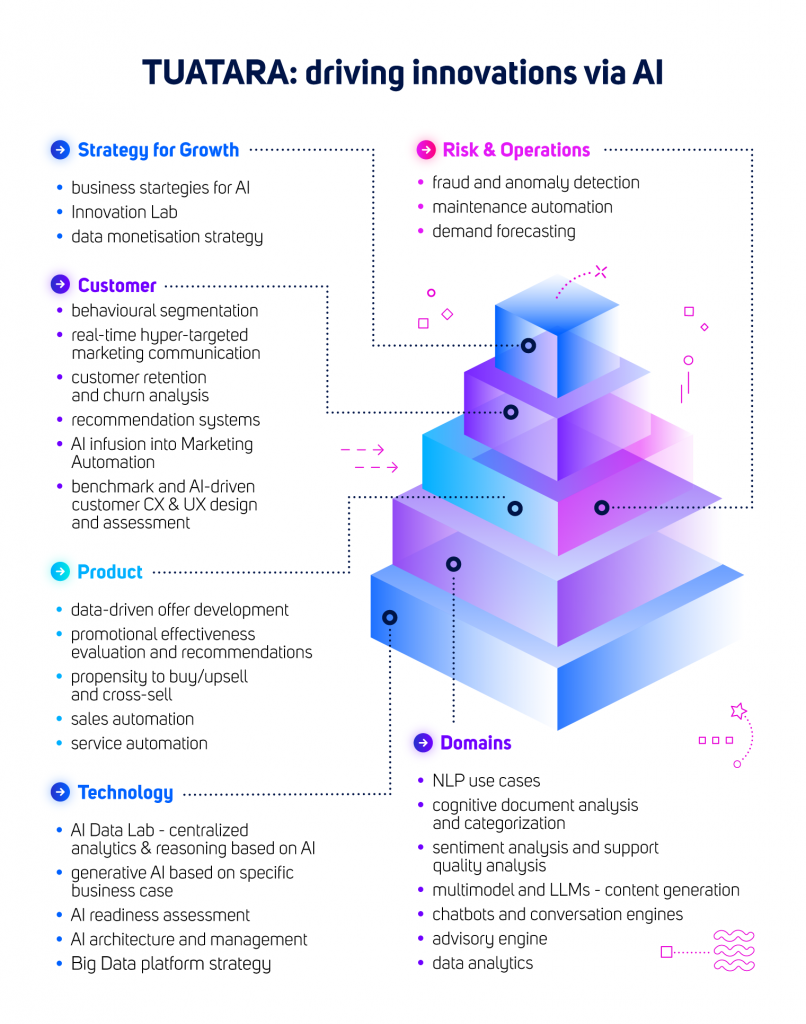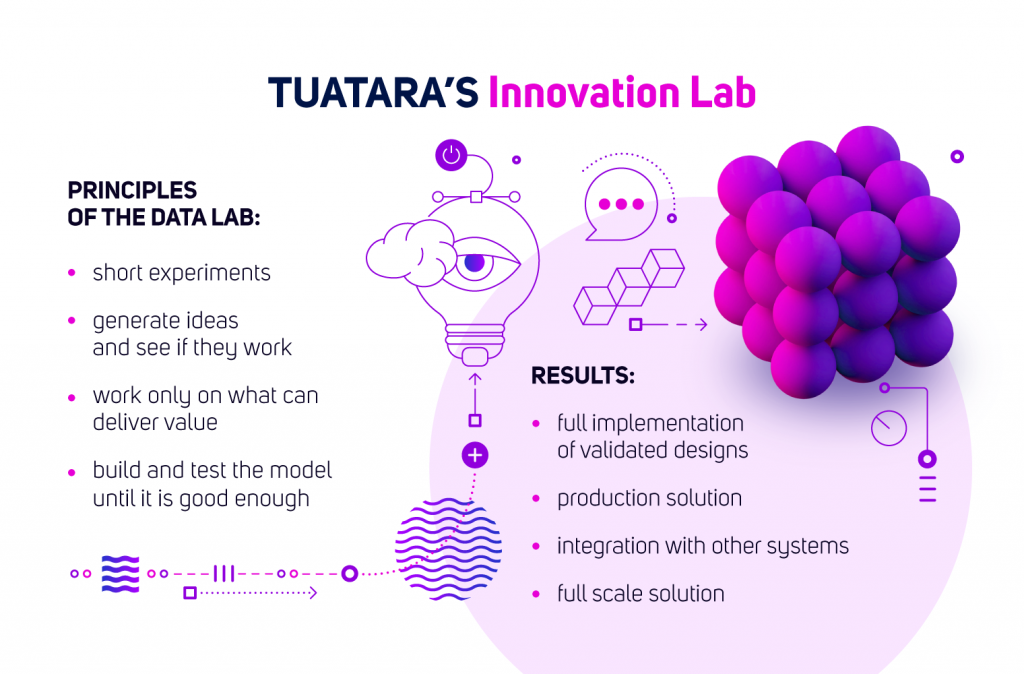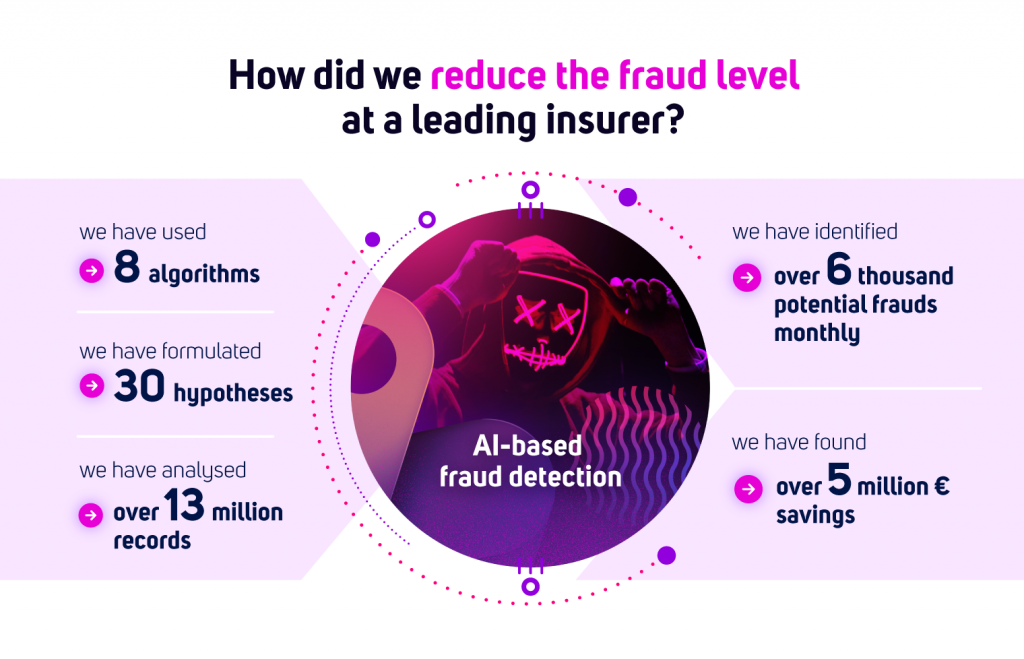Data analysis and visualization
Data analytics and visualization are the cornerstones of understanding complex data structures. Through these techniques, we transform raw, unstructured data into meaningful insights presented in a visually appealing manner. These insights are not just numbers or statistics; they tell a story about the business, its customers, and its market position.
At TUATARA, our advanced tools and methodologies ensure that businesses can easily interpret and act upon these insights. The visual representation of data simplifies complex datasets, providing a clear picture of underlying trends and patterns. Imagine being able to see, at a glance, the performance metrics of a particular product, or understanding customer behavior over a specific period. Such insights are invaluable in making informed business decisions. 
In an era where data is generated at an unprecedented rate, our solutions offer businesses a competitive edge. By identifying trends and making accurate predictions, businesses can strategize more effectively. This proactive approach allows companies to stay ahead of the curve, anticipate market shifts, and tailor their strategies accordingly.
Moreover, with the integration of AI and machine learning, the potential of data analytics and data science is limitless. Predictive analytics, for instance, can forecast future trends based on historical data, enabling businesses to prepare and adapt in advance.
As we move further into the digital age, the role of data analytics and data science in business cannot be overstated. It’s not just about understanding data; it’s about leveraging that understanding to drive growth, innovation, and success. At TUATARA, we are committed to helping businesses realize the full potential of their data, ensuring they remain at the forefront of their respective industries.
Data Science Models
In the realm of modern business, data is more than just numbers and statistics; it’s the lifeblood that drives decision-making, innovation, and growth. However, the sheer volume and complexity of data generated today requires sophisticated tools to extract meaningful insights. Enter the world of data science models.
Data science models are algorithmic structures that process data to derive actionable insights. These models, ranging from predictive algorithms to machine learning structures, are the backbone of modern AI applications. They sift through vast datasets, identifying patterns, trends, and anomalies, transforming raw information into valuable knowledge.
Our team at TUATARA specializes in developing a wide range of models tailored to specific business needs. From predictive maintenance to demand forecasting, we ensure that our models drive tangible results. Our expertise lies in understanding the unique challenges and objectives of each business, allowing us to design models that align perfectly with their goals. 
In the global business landscape, these models empower companies to optimize operations, enhance customer experiences, and innovate products, ensuring they stay ahead in the competitive market. For instance, a retailer can use predictive models to forecast inventory needs, ensuring they never run out of stock during peak demand periods. Similarly, a manufacturing company can leverage machine learning models to predict equipment failures, leading to timely maintenance and reduced downtime.
Furthermore, as businesses continue to evolve and adapt to the ever-changing market dynamics, the flexibility and scalability of our models at TUATARA ensure that they remain relevant and effective. By continuously learning and adapting, these models can accommodate new data sources, changing customer behaviors, and emerging market trends.
Data science models are not just tools; they are strategic assets that propel businesses towards success in the digital age. At TUATARA, we are at the forefront of this revolution, championing the cause of data-driven decision-making and ensuring our clients achieve unparalleled excellence in their domains.
Data-in-motion Analytics and Decision Rules Design
In the age of digital transformation, the speed at which data is generated, processed, and acted upon can be the difference between success and stagnation. Traditional data analytics, which often involves batch processing of historical data, is no longer sufficient to meet the demands of today’s dynamic business environment. Enter the realms of data-in-motion analytics and decision rules design.
Data-in-motion analytics refers to the real-time processing and analysis of streaming data. This is crucial in today’s fast-paced digital world where decisions often need to be made instantaneously based on live data feeds. Whether it’s monitoring customer interactions on a website, tracking supply chain movements, or analyzing financial transactions as they occur, real-time insights are invaluable. They allow businesses to identify opportunities, mitigate risks, and adapt strategies on-the-fly.
At TUATARA, we recognize the transformative potential of data-in-motion analytics. Our solutions in this domain empower businesses with real-time decision-making capabilities. By integrating advanced algorithms, we ensure that businesses can respond rapidly to market changes, seizing opportunities and navigating challenges with unparalleled agility.
Decision rules design, on the other hand, is about creating algorithms that make automated decisions based on specific criteria. Think of it as setting a series of “if-then” conditions that guide business operations. For instance, if a product’s inventory drops below a certain threshold, an automated order can be placed to replenish stock. This enables rapid response to market changes, efficient resource allocation, and proactive problem-solving. By automating decision-making processes, businesses can ensure consistency, reduce human error, and optimize operations.
Ss the business landscape becomes increasingly data-driven, the ability to analyze data in real-time and make automated decisions becomes a game-changer. With TUATARA’s expertise in data-in-motion analytics and decision rules design, businesses are equipped to thrive in this new era, staying one step ahead of the competition and consistently delivering exceptional value to their stakeholders.
Data Discovery, Retention, and Anonymization
Data Analytics and Visualization are the lifeblood that fuels business growth and innovation. However, with the immense benefits that data brings, it also introduces challenges related to security, privacy, and compliance. To navigate these challenges, businesses must prioritize data discovery, retention, and anonymization.
Data discovery is the process of finding and understanding data sources. It’s akin to a treasure hunt, where businesses sift through vast amounts of data to identify valuable insights. This process not only helps in understanding where the data comes from but also its relevance and potential impact on business decisions.
Retention, on the other hand, involves storing this data for future use. It’s about preserving valuable insights for future analysis and decision-making. However, retention is not just about storage; it’s about ensuring that data remains accessible, usable, and relevant over time.
While discovery and retention are crucial, they must be balanced with the need for privacy and security. This is where anonymization comes into play. Anonymization ensures that personal or sensitive data is modified to protect individual privacy. By stripping away identifiable information, businesses can analyze and share data without risking the exposure of personal details.
At TUATARA, we understand the intricacies of data management in the digital age. We place a strong emphasis on data security and privacy. Our data management practices ensure that businesses can leverage data insights without compromising on security. Our tools and methodologies are designed to seamlessly integrate discovery, retention, and anonymization, ensuring that data is both a valuable asset and a protected resource.
In an era where data breaches and privacy concerns are rampant, maintaining this balance is not just about compliance but also about building trust with customers and stakeholders. Trust, in today’s world, is a currency more valuable than gold. By prioritizing data security and privacy, businesses not only safeguard their operations but also strengthen their relationships with customers, partners, and stakeholders.
Automated Data Management
Data is often likened to oil – a valuable resource that powers businesses. However, just as crude oil needs refining to be useful, raw data requires meticulous management to transform it into actionable insights. With the exponential growth in data volume and complexity, manual management is no longer feasible. Enter the world of automated data management.
Automated data management involves using technology to streamline data processes, from collection to analysis. This isn’t just about speed; it’s about precision. Automation reduces human error, ensuring that data remains accurate and reliable. It increases efficiency, allowing businesses to process vast amounts of data in a fraction of the time it would take manually. Most importantly, it ensures data integrity, guaranteeing that insights derived are based on consistent and trustworthy data. 
At TUATARA, we recognize the transformative potential of automation in data management. Our approach focuses on ensuring data consistency and timely insights. By leveraging cutting-edge technology and best practices, we position businesses at the forefront of innovation. Our solutions are designed to adapt to the unique needs of each business, ensuring that data management is not just efficient but also aligned with business objectives.
In the context of global businesses, where vast amounts of data are generated across different regions and systems, automation is pivotal. It’s not just about handling volume; it’s about ensuring coherence. Data generated in one region must be consistent with data from another. Insights derived today must align with those from yesterday. Automation ensures this consistency, providing businesses with timely insights that reflect the true state of their operations. As businesses grow and expand, automation allows them to scale operations without proportionally increasing overheads. This scalability ensures that businesses remain agile, able to adapt to market changes without being bogged down by data management challenges.
Data Warehouse and Data Lake Architectures
In the intricate tapestry of modern business operations, data threads weave together to form the bigger picture. However, managing this vast and varied data landscape requires specialized structures. Two of the most prominent and essential architectures in this realm are data warehouses and data lakes.
Data warehouses are centralized repositories designed specifically for structured data. Think of them as vast libraries where data is meticulously categorized, indexed, and stored, making it easily accessible for analysis. They are optimized for fast query performance, allowing businesses to quickly derive insights from their data.
Conversely, data lakes are more like vast reservoirs that store a broader spectrum of data, including unstructured and semi-structured data. This could range from raw text files and logs to more complex data like images and videos. The flexibility of data lakes allows businesses to store data in its native format, ensuring no valuable information is lost in translation.
At TUATARA, we understand the nuances and intricacies of these architectures. We specialize in developing robust data warehouse and data lake architectures that are scalable, efficient, and tailored to the unique needs of each business. Our solutions are designed to ensure that businesses can easily store, access, and analyze their data, turning it from a potential liability into a powerful asset.
As data continues to be the driving force behind business decisions, the importance of robust data architectures cannot be overstated.
With TUATARA’s expertise in Data Analytics and Visualization and data lake architectures, businesses are poised to harness the full potential of their data, ensuring they remain competitive, innovative, and data-driven in the global market, where businesses often operate across multiple regions with diverse data sources. It is crucial to have an unified data architecture.
Imagine trying to derive insights from fragmented data scattered across different systems and regions. The result would be incomplete at best and misleading at worst. A unified architecture not only streamlines data processes but also ensures that insights derived are holistic, taking into account the entirety of a business’s operations.





